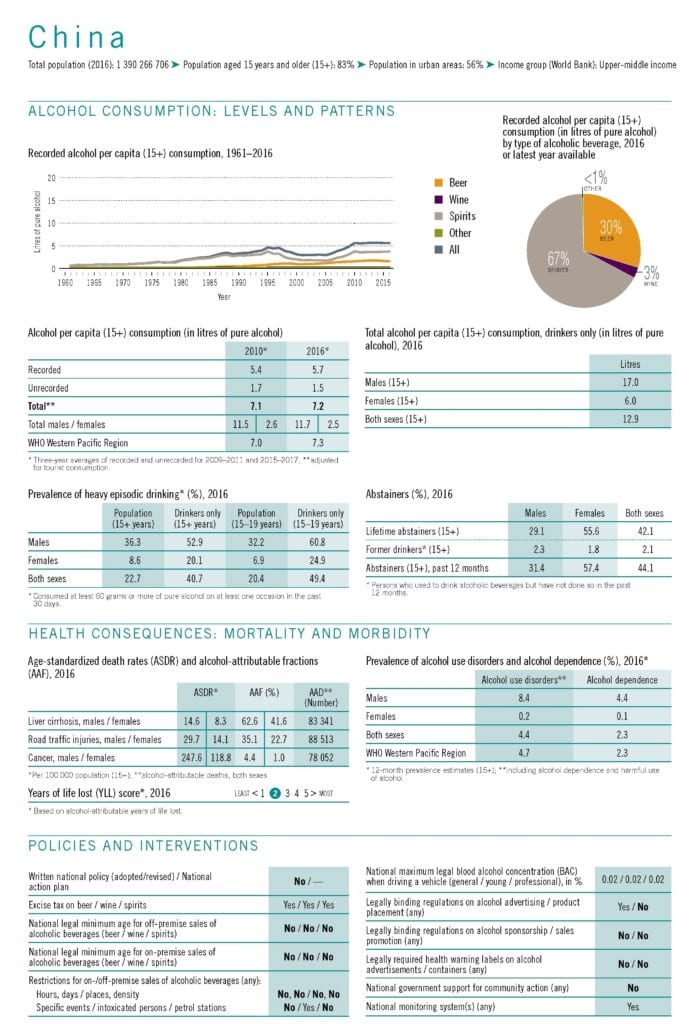The Chinese government has stepped up action to change the country’s harmful alcohol norm.
According to Chinese state media outlet CCTV, civil courts in the country can also hold someone legally accountable for the following actions:
- Failing to escort an intoxicated companion to safety or to send them to a hospital if necessary;
- Persuading someone to have alcohol while knowing they have an alcohol allergy or alcohol-adverse condition;
- Failing to stop an intoxicated person from driving; and
- Encouraging an already intoxicated person to have more alcohol.
The warnings came out in February this year, when China’s Supreme People’s Procuratorate published a video detailing the four guidelines. In mid-November the guidelines gained traction on websites and social media pages of dozens of state-affiliated outlets and organizations, including Xinhua Daily News, China Youth Daily, and local government bulletins.
As of Monday, the hashtag #4drinkingbehaviorsthatrequirelegalresponsibility accumulated 280 million page views on social media platform Weibo.
Increasing attention to grave alcohol violence and other harm
The Chinese government’s action comes after several driving under the influence crashes and a high profile case of alcohol fueled violence. In September, the shocking revelations of a rape case in Chinese tech giant Alibaba – which Movendi International covered – opened up the issue of China’s toxic alcohol workplace norms. The employee who was violated was forced to consume alcohol till unconscious due to the toxic workplace alcohol culture in China.
As Movendi International has previously covered, alcohol use is pervasive in Chinese business culture. Refusing an invitation to have alcohol from a superior or a client can threaten career progress or closing business deals.
Employees find this workplace alcohol norm harmful and the recent incidents have sparked public outcry. People are increasingly demanding for companies to change the toxic workplace culture related to alcohol.
The Chinese government appears to be taking action to put a stop to this toxic workplace culture.
There are also other signs that the Chinese government is increasingly interested in curbing alcohol harm in the country. For example, recently, the Chinese government acknowledged the alcohol-cancer link.
Comprehensive alcohol policy solutions are now needed more than ever in China, where the alcohol burden is climbing.
According to latest scientific evidence on alcohol and cancer,
- China had a larger alcohol-related cancer burden than the global average (4%).
- 282,300 cancer cases in China, or 6% of all cancers in the country, were caused by alcohol.
According to the World Health Organization (WHO), recorded per capita alcohol consumption has been increasing in China from 1961 to 2016. Binge alcohol use is high in the country, with over one-third (40.7%) of alcohol users engaging in this especially harmful behavior.
In 2016, alcohol caused:
- over 83,000 deaths from liver cirrhosis,
- over 88,500 deaths from road traffic injury, and
- over 78,000 deaths from cancer, in China, according to the WHO Global Alcohol Status Report 2018, which is based on data from 2016.
Despite rising alcohol harm in the country, China has does not implement evidence-based alcohol policies. For instance, there is no national alcohol policy, minimum age for alcohol purchase, or regulations for on- and off-premise sale. Marketing is insufficiently regulated, only for advertising and not for sponsorships or promotions.
There is more to do for the Chinese government in order to develop and implement modern, scientifically proven, and cost-effective alcohol policy solutions. For example, a brand new WHO report shows that the alcohol policy Best Buy solutions are the second best set of options among all 16 NCD Best Buys regarding return on investment.
More comprehensive alcohol policy making in China would benefit people, communities, and society greatly, reducing grave harm, alleviating alcohol’s health, social, and economic burden, and yielding significant returns on investment, as well as additional revenues for the Chinese government. The latest WHO report also highlights alcohol and tobacco taxation specifically, as high-impact measures to finance NCDs prevention.
